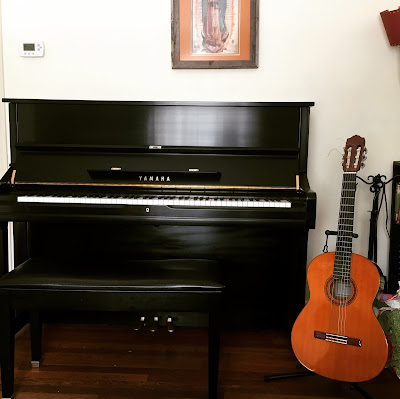At the UMKC Conservatory of Music, I took piano classes and began to experiment with my own ideas, but the drums called for most of my time and focus. My knowledge of harmony was pretty limited, although my ears were expanding every day, hanging with friends and listening to records, learning more and more tunes by ear.
My roommates had guitars around the house and I started learning chords. It was very difficult, contorting my hand into positions that seemed nearly impossible for a human hand. But, eventually, I could play major, minor and dominant chords enough to be able to begin assembling my own ideas.
It was liberating. I could play the guitar with no expectations. It was pure fun. Soon, a few tunes were born. Mostly country-ish jams that were super simple, yet very rewarding for me. Then a while later I took guitar classes at the New School and opened up my chord vocabulary. More tunes were born, but mostly the basic germ of the tune, just a foundational idea or starting point.
With help of friends who would suggest chords to go with my melodies, I completed a batch of tunes. But I wasn't really satisfied with them. I recorded them on a few occasions. Two of them are on my album "Suit-up!" which was produced by Dave Stryker and also featured Kyle Koehler on B-3.
The response to my tunes was very encouraging. One of them played on XM Radio and I got some royalty checks in the mail. Wow! OK. Let's do more.
I sat down with almost 20 years of ideas that I'd documented on cassettes, mini-discs and on the computer. Many of them were unfinished, but had potential. But, like Charles Bukowski said: Potential doesn't mean anything... You've got to DO IT."
So I searched and found a local piano teacher, Bob Himmelberger, who listened to my whole life story about never really getting my piano thing together and started me on a path to being able to finish my tunes. It was not going to be easy, but at this point, what else am I going to do? What's to lose?
I learned scales in all 12 keys. Minor, Major and Dominant chords in root position. This took a minute, but so far so good. Then all the chords using A and B voicings. The anty was raised and this took quite a while. Then 2-5-1 progressions in all 12 keys using the new voicings. Then 2-5-2 Tri tone subs. Then standards like "Lady Bird" and "Confirmation".
Soon, I understood how to use chord tones and I sat down with my collection of ideas and started adding melodies, then new sections to the tunes, then finally, finishing some of them. This was quite possibly the most rewarding thing ever!
I took the tunes to sessions and played them down with the cats. It was like going back to school! Some of the tunes clunked along like cars with a wheel missing, but at least now I knew what to do. I went back and fourth to the drawing board, until finally I had 12 new tunes!
This was quite a thing for me. Drummers are often stigmatized with not being complete musicians, which can be true in some cases if the drummer is not hearing the harmony. A drummer may not know the complete theory behind a 2-5-1, but if you can hear it, then you can play accordingly. But now really knowing what's going on, theoretically and sonically with the piano, I felt a big change in my playing and hearing.
Anyways, I write about all this because it has been such a journey for me and has opened up a lot of doors. I understand music itself much better now and even tho I have a long way to go, it feels really good to have my own book of music to play and record.
If you're a drummer and you're reading this, maybe you are thinking about those piano lessons, or wondering how to get started writing your own music.
One of the best ways to get started is to do just that: get started. And take it from there.
There is an artist inside you. Composition reveals that. Especially when you're absolutely true to yourself. Yeah, you could use someone else's chord changes and melodies, but when you're true to your ear, you'll have your own sound. I really believe that.
Anyways, that's a little piece of what I've been experience in writing. It's getting better all the time and there ain't nothing to it but to do it. Write. learn. And write some more.







